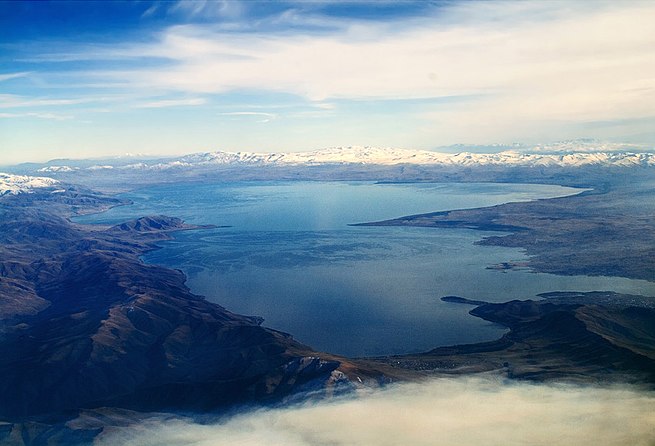
Main Difference
The main difference between Lake and River is that the Lake is a body of relatively still water, localized in a basin and River is a natural watercourse.
-
Lake
A lake is an area filled with water, localized in a basin, that is surrounded by land, apart from any river or other outlet that serves to feed or drain the lake. Lakes lie on land and are not part of the ocean, and therefore are distinct from lagoons, and are also larger and deeper than ponds, though there are no official or scientific definitions. Lakes can be contrasted with rivers or streams, which are usually flowing. Most lakes are fed and drained by rivers and streams.
Natural lakes are generally found in mountainous areas, rift zones, and areas with ongoing glaciation. Other lakes are found in endorheic basins or along the courses of mature rivers. In some parts of the world there are many lakes because of chaotic drainage patterns left over from the last Ice Age. All lakes are temporary over geologic time scales, as they will slowly fill in with sediments or spill out of the basin containing them.
Many lakes are artificial and are constructed for industrial or agricultural use, for hydro-electric power generation or domestic water supply, or for aesthetic, recreational purposes, or other activities.
-
River
A river is a natural flowing watercourse, usually freshwater, flowing towards an ocean, sea, lake or another river. In some cases a river flows into the ground and becomes dry at the end of its course without reaching another body of water. Small rivers can be referred to using names such as stream, creek, brook, rivulet, and rill. There are no official definitions for the generic term river as applied to geographic features, although in some countries or communities a stream is defined by its size. Many names for small rivers are specific to geographic location; examples are “run” in some parts of the United States, “burn” in Scotland and northeast England, and “beck” in northern England. Sometimes a river is defined as being larger than a creek, but not always: the language is vague.Rivers are part of the hydrological cycle; water generally collects in a river from precipitation through a drainage basin from surface runoff and other sources such as groundwater recharge, springs, and the release of stored water in natural ice and snowpacks (e.g., from glaciers). Potamology is the scientific study of rivers, while limnology is the study of inland waters in general. Most of the major cities of the world are situated on the banks of rivers, as they are, or were, used as a source of water, for obtaining food, for transport, as borders, as a defensive measure, as a source of hydropower to drive machinery, for bathing, and as a means of disposing of waste.
-
Lake (noun)
A small stream of running water; a channel for water; a drain.
-
Lake (noun)
A large, landlocked stretch of water.
-
Lake (noun)
A large amount of liquid; as, a wine lake.
-
Lake (noun)
A pit, or ditch
-
Lake (noun)
An offering, sacrifice, gift.
-
Lake (noun)
Play; sport; game; fun; glee.
-
Lake (noun)
A kind of fine, white linen.
-
Lake (noun)
In dyeing and painting, an often fugitive crimson or vermillion pigment derived from an organic colorant (cochineal or madder, for example) and an inorganic, generally metallic mordant.
-
Lake (verb)
To present an offering.
-
Lake (verb)
To leap, jump, exert oneself, play.
-
Lake (verb)
To make lake-red.
-
River (noun)
A large and often winding stream which drains a land mass, carrying water down from higher areas to a lower point, ending at an ocean or in an inland sea.
“Occasionally rivers overflow their banks and cause floods.”
-
River (noun)
Any large flow of a liquid in a single body.
“a river of blood”
-
River (noun)
The last card dealt in a hand.
-
River (noun)
A visually undesirable effect of white space running down a page, caused by spaces between words on consecutive lines happening to coincide.
-
River (noun)
One who rives or splits.
-
River (verb)
To improve one’s hand to beat another player on the final card in a poker game.
“Johnny rivered me by drawing that ace of spades.”
-
Lake (noun)
a large area of water surrounded by land
“Lake Victoria”
“boys were swimming in the lake”
-
Lake (noun)
the Lake District.
-
Lake (noun)
a pool of liquid
“the fish was served in a lake of spicy sauce”
-
Lake (noun)
a large surplus of a liquid commodity
“the EU wine lake”
-
Lake (noun)
an insoluble pigment made by combining a soluble organic dye and an insoluble mordant.
-
Lake (noun)
a purplish-red pigment made in the same way as lake, originally one obtained from lac.
-
River (noun)
a large natural stream of water flowing in a channel to the sea, a lake, or another river
“the Mekong River”
“river pollution”
“the River Danube”
-
River (noun)
a large quantity of a flowing substance
“great rivers of molten lava”
-
River (noun)
used in names of animals and plants living in or associated with rivers, e.g. river dolphin.
